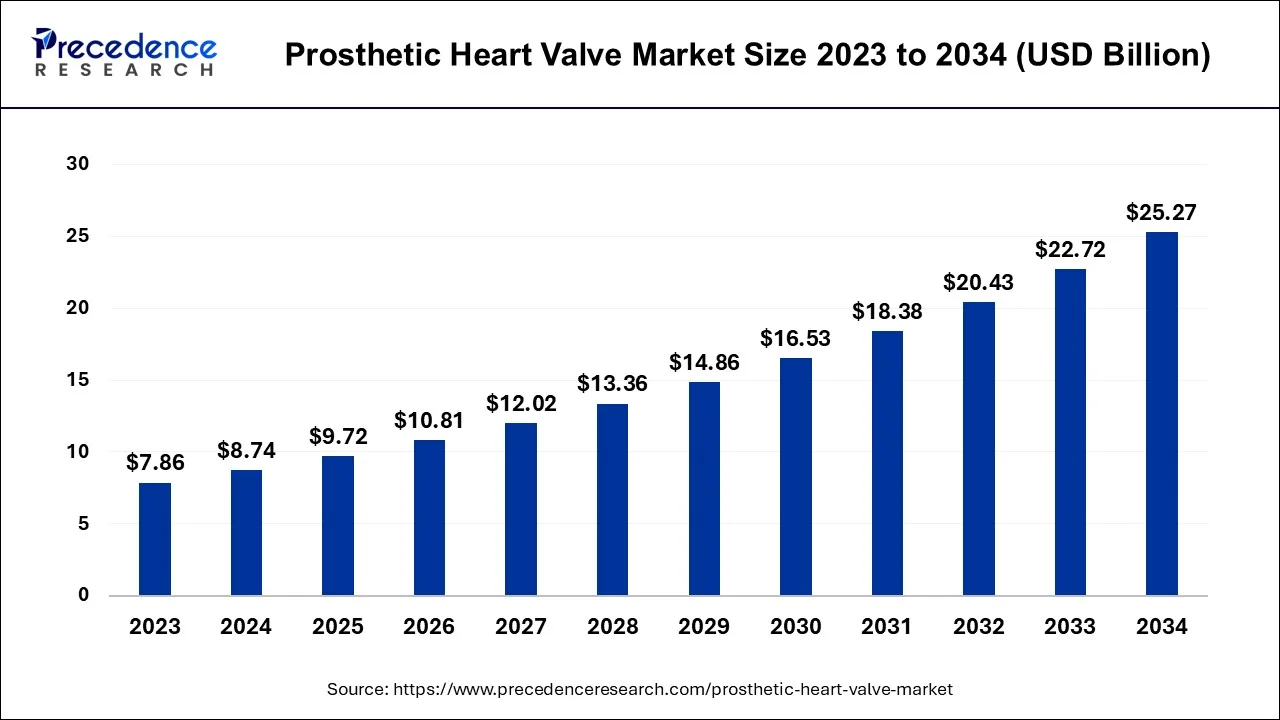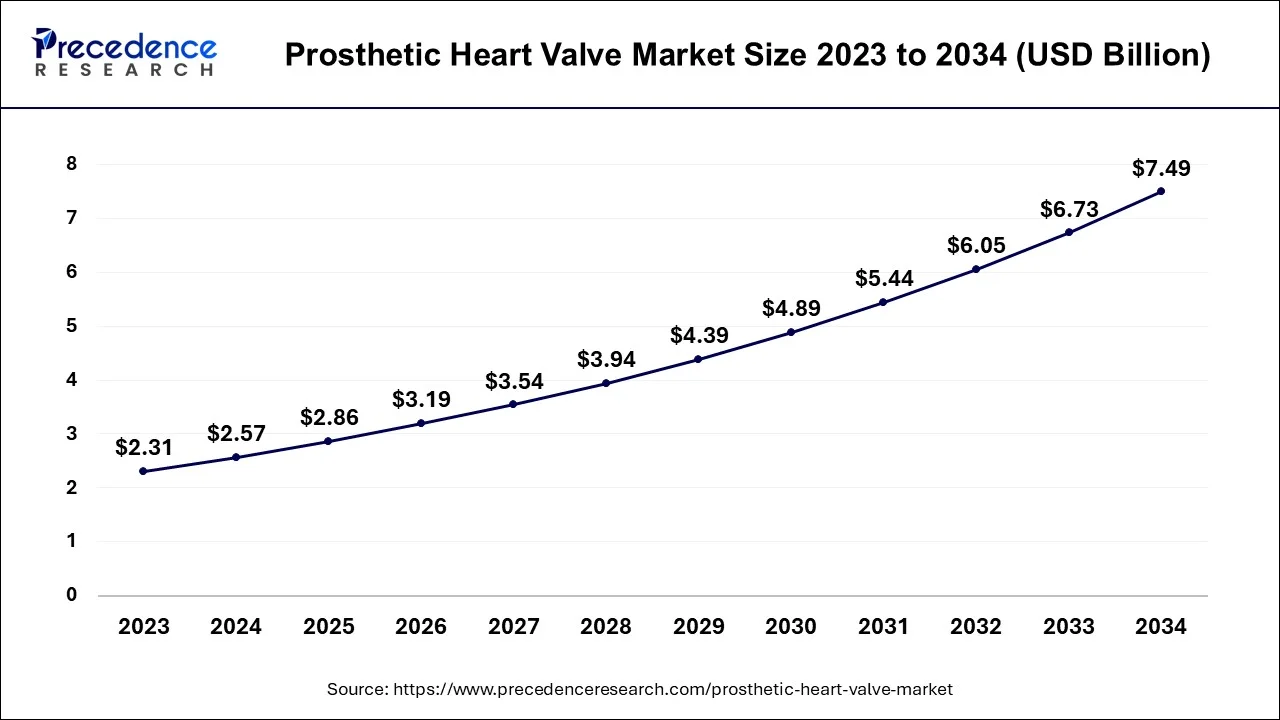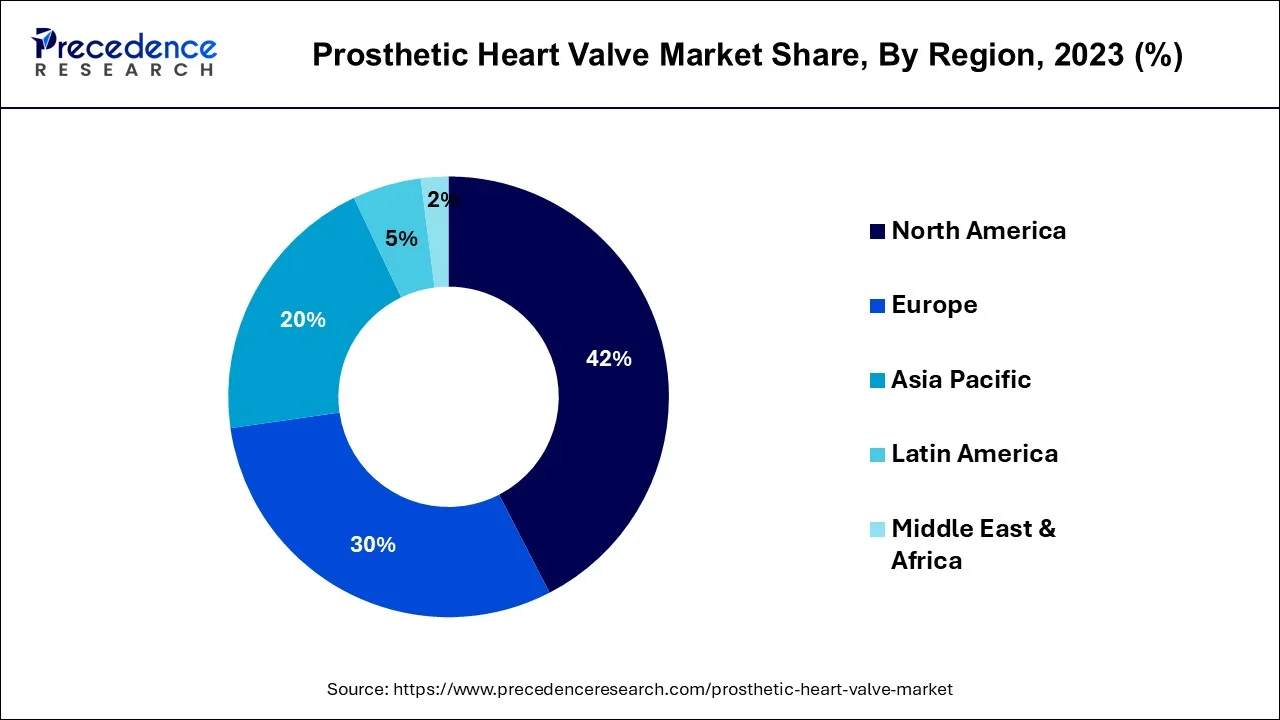November 2024
The global prosthetic heart valve market size accounted for USD 8.74 billion in 2024, grew to USD 9.72 billion in 2025 and is projected to surpass around USD 25.27 billion by 2034, representing a healthy CAGR of 11.20% between 2024 and 2034.
The global prosthetic heart valve market size is estimated at USD 8.74 billion in 2024 and is anticipated to reach around USD 25.27 billion by 2034, expannding at a CAGR of 11.20% between 2024 and 2034.

The U.S. prosthetic heart valve market size accounted for USD 2.57 billion in 2024 and is expected to be worth around USD 7.49 billion by 2034, growing at a CAGR of 11.29% from 2024 to 2034.

North America has held the largest revenue share of 41% in 2023. North America dominates the prosthetic heart valve market due to factors like advanced healthcare infrastructure, high healthcare spending, and a significant prevalence of cardiovascular diseases. The region's well-established research and development capabilities contribute to continuous technological innovations in prosthetic heart valves.
Moreover, a growing aging population and increasing awareness about available cardiac interventions further drive the demand. Robust regulatory frameworks and reimbursement policies also play a crucial role in maintaining North America's major market share by fostering a favorable environment for the development and adoption of advanced prosthetic heart valve technologies.

Asia Pacific is estimated to observe the fastest expansion. Asia-Pacific commands a significant share in the prosthetic heart valve market due to a combination of factors. The rising geriatric population, increasing prevalence of cardiovascular diseases, and improving healthcare infrastructure contribute to the region's prominence.
Moreover, a surge in awareness, growing healthcare investments, and a shift towards advanced medical technologies fuel the demand for prosthetic heart valves. With a focus on innovation and expanding access to cardiac care, Asia Pacific stands as a key player in driving market growth for prosthetic heart valves.
A prosthetic heart valve is a sophisticated medical device crafted to replace a faulty natural heart valve, essential for maintaining proper blood flow through the heart. The heart comprises four valves—tricuspid, pulmonary, mitral, and aortic, each vital for regulating blood circulation in the chambers. Conditions such as valvular heart disease or congenital defects can impair these valves, necessitating the use of prosthetic alternatives.
Prosthetic heart valves come in two primary types: mechanical and biological. Mechanical valves, constructed from robust materials like titanium or carbon, demand ongoing blood-thinning medications to prevent clotting. Conversely, biological valves, often sourced from animal tissues or human donors, offer an option without the need for long-term blood thinners, though they may have a more limited lifespan.
The selection between these options depends on factors such as the patient's age, overall health, and lifestyle. In the realm of cardiac care, prosthetic heart valves stand as pivotal instruments, restoring cardiac function and enhancing the well-being of individuals grappling with valvular issues.
| Report Coverage | Details |
| Growth Rate from 2024 to 2034 | CAGR of 11.20% |
| Market Size in 2024 | USD 8.74 Billion |
| Market Size by 2034 | USD 25.27 Billion |
| Largest Market | North America |
| Base Year | 2024 |
| Forecast Period | 2024 to 2034 |
| Segments Covered | Product, Position, and Region |
| Regions Covered | North America, Europe, Asia-Pacific, Latin America, and Middle East & Africa |
Increasing incidence of cardiovascular diseases and minimally invasive procedures
The escalating incidence of cardiovascular diseases serves as a driving force behind the surging demand for prosthetic heart valves. As heart-related ailments become more prevalent globally, the need for effective interventions, such as prosthetic heart valves, intensifies. The market responds to this growing health concern by providing innovative and advanced solutions to address various valvular issues, contributing to an expanding patient pool seeking these life-saving interventions.
Furthermore, the increasing popularity of minimally invasive procedures significantly propels the market demand for prosthetic heart valves. Patients and healthcare providers alike are drawn to these procedures due to their reduced invasiveness, quicker recovery times, and lower postoperative complications. This trend aligns with a broader shift in medical practices towards less intrusive interventions, making prosthetic heart valves more accessible and appealing to a larger demographic, thereby fueling the market's growth.
Prosthetic heart valve
The prosthetic heart valve market faces constraints in its growth trajectory due to a shortage of skilled healthcare professionals and the inherent risk of complications associated with the procedures. The intricate nature of prosthetic heart valve surgeries necessitates a high level of expertise among healthcare practitioners. However, a shortage of skilled professionals proficient in these specialized procedures poses a significant bottleneck, limiting the widespread adoption of prosthetic heart valves.
This scarcity not only hampers the accessibility of these life-saving interventions but also contributes to increased surgical risks. Moreover, the risk of complications, such as blood clots or infections, during and after prosthetic heart valve implantation procedures raises concerns among both healthcare providers and patients.
The potential for adverse events can deter individuals from opting for these interventions, impacting patient confidence and, consequently, impeding the overall growth of the prosthetic heart valve market. Addressing these challenges requires strategic efforts to enhance medical education and training programs, ensure a competent workforce, and continuous advancements in technologies to mitigate the risks associated with prosthetic heart valve procedures.
Expanding geriatric population and focus on bioengineered solutions
The expanding geriatric population worldwide presents a significant opportunity in the prosthetic heart valve market. With age being a prominent risk factor for valvular heart diseases, the rise in elderly individuals correlates with an increased demand for prosthetic heart valves. This demographic shift underscores the importance of developing and providing advanced cardiac solutions to cater to the specific needs of an aging population, thereby driving market growth.
Simultaneously, the focus on bioengineered solutions in prosthetic heart valve development opens new avenues. Bioengineered valves, designed to mimic natural tissue properties, hold the promise of improved durability and reduced complications. As the demand for biocompatible and long-lasting alternatives rises, the market can capitalize on bioengineering advancements to offer innovative prosthetic heart valve options. This emphasis on technological innovation aligns with the growing trend towards personalized and patient-centric healthcare, creating opportunities for manufacturers and researchers to contribute to the evolution of the prosthetic heart valve market.
The transcatheter heart valve segment has held a 41% revenue share in 2023. The transcatheter heart valve, a pivotal product in the prosthetic heart valve market, involves a minimally invasive approach to valve replacement. This innovative technology allows for the implantation of the prosthetic valve through catheter-based procedures, avoiding the need for traditional open-heart surgery.
As a trend, transcatheter heart valves are gaining prominence for their reduced recovery times, lower complications, and increasing applications across a spectrum of patients, including those considered high-risk or inoperable. The market is witnessing a shift towards these less invasive options, driving advancements and adoption of transcatheter heart valve technologies.
The mechanical heart valve segment is anticipated to expand at a significant CAGR of 12.4% during the projected period. A mechanical heart valve is a prosthetic device composed of durable materials such as titanium or carbon, designed to replace a malfunctioning natural heart valve. It operates through mechanical opening and closing mechanisms, regulating blood flow within the heart.
In the prosthetic heart valve market, the mechanical heart valve segment is witnessing trends towards enhanced durability and biocompatibility. Ongoing research focuses on developing innovative materials and refining design features to improve longevity and reduce the need for lifelong anticoagulant medications, addressing key concerns associated with mechanical heart valves.
The mitral valve segment had the highest market share of 38% in 2023. The mitral valve, a crucial component of the heart's anatomy, regulates blood flow between the left atrium and ventricle. In the prosthetic heart valve market, the mitral valve segment involves the development and deployment of artificial valves specifically designed for this cardiac position.
Trends in this segment include ongoing advancements in mitral valve replacement technologies, with a focus on improving durability, reducing complications, and enhancing overall patient outcomes. As innovations continue to address mitral valve-related issues, the market experiences a positive trajectory in meeting the specific needs of individuals with mitral valve disorders.
The aortic valve segment is anticipated to expand fastest over the projected period. The aortic valve, a crucial component of the heart, regulates blood flow from the left ventricle to the aorta. In the prosthetic heart valve market, aortic valve replacements address conditions like aortic stenosis or regurgitation. Emerging trends in aortic valve prosthetics focus on transcatheter aortic valve replacement (TAVR), a minimally invasive technique gaining prominence. TAVR offers reduced recovery times and is increasingly preferred, contributing to a notable shift in the market towards less invasive approaches for aortic valve interventions.
Segments Covered in the Report
By Product
By Position
By Geography
For inquiries regarding discounts, bulk purchases, or customization requests, please contact us at sales@precedenceresearch.com
No cookie-cutter, only authentic analysis – take the 1st step to become a Precedence Research client
November 2024
October 2024
July 2024
August 2024